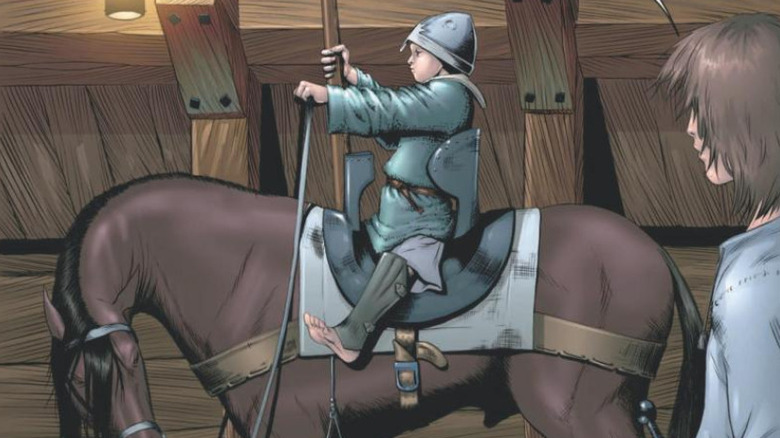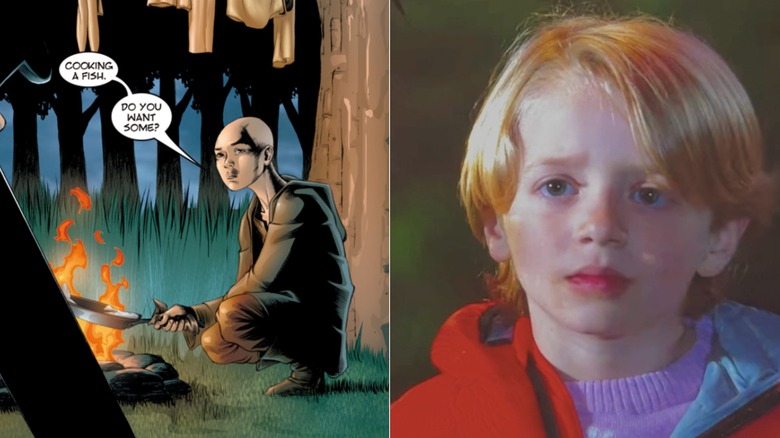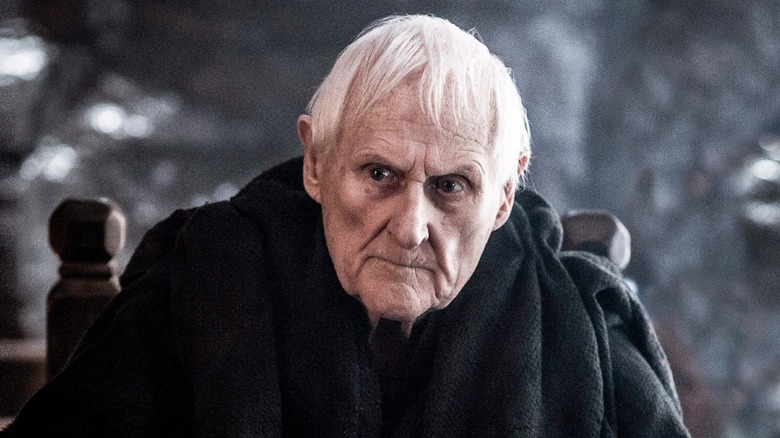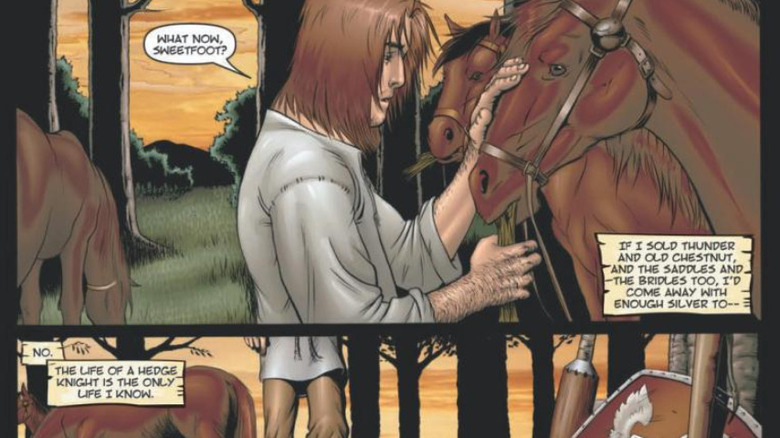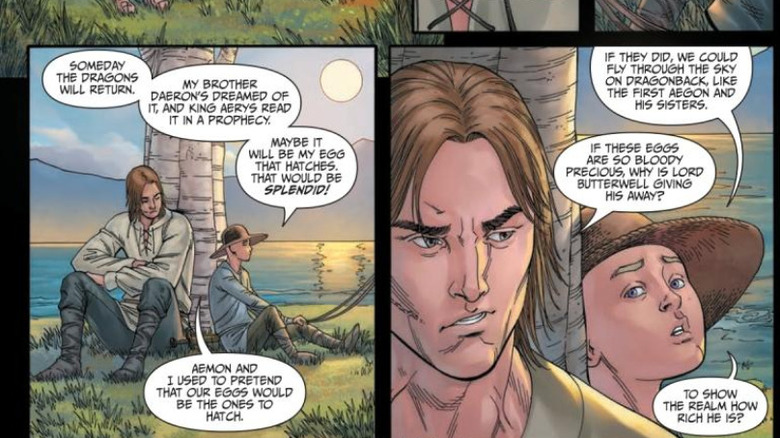The Next Game Of Thrones Prequel Casts Two Of The Most Important Characters In Westerosi History
Although many critics were skeptical of "House of the Dragon," arguing that the finale of "Game of Thrones" was so horrendous that it may have killed any audience interest in another TV show set in the same universe, the 2022 spinoff's first season was a pretty clear success. It was so good, in fact, that it's now paved the way for a new spinoff series, once again set in Westeros during the Targaryens' reign.
That's right: "A Knight of the Seven Kingdoms: The Hedge Knight," which was officially greenlit by HBO in 2023, has now cast the largely unknown actor Peter Claffey as the young knight Dunk, plus the 9-year-old Dexter Sol Ansell as the pre-pubescent Egg. Details are still sparse, but we know the casting department's got their priorities right: the 6'4" Claffey seems perfect for the famously tall Dunk, who eventually earns the nickname Ser Duncan the Tall. Meanwhile, Dexter Sol Ansell (who played child Coriolanus Snow in the recent "Hunger Games" prequel) seems perfect for the young, secretly royal Egg.
For viewers unfamiliar with the three novellas focused on these two characters (or the graphic novels based on them), this choice of spinoff might seem bizarre. Why would HBO focus a show on these two apparent nobodies, characters who've never been major players in either TV series so far? The answer is that as unassuming as they may seem, Duncan and Egg are two deeply important characters in Westerosi history. They may not have done anything as dramatic as the Dance of Dragons or the conquest of Dorne, but their life stories tell us a ton about the way Westeros had changed in the years between "House of the Dragon" and "Game of Thrones."
Who is Egg?
Egg, aka Aegon, is initially assumed by Dunk to be a stable boy. His distinctive Targaryen silver hair had recently been shaved by his older brother to keep their identities hidden, and that's how it stays for the rest of the series. Not knowing his identity, Dunk agrees to let Aegon be his squire, and so begins a lifelong friendship that dramatically improves the course of both their lives. Dunk teaches Aegon valuable lessons about hard work, honor, and staying connected to the plight of the smallfolk. This is particularly valuable considering how much the Targaryens have a strong reputation for being selfish, coddled, elitist people, as shown by the spoiled and reckless ways of Aegon's older brothers. The book takes place in 210 A.C. (After Conquest), and the Targaryens' hold on the Seven Kingdoms is already weaker than it was during the events of "House of the Dragon." (Most notably, the Targaryens had already lost their famous dragons.)
This character development for young Egg is particularly important given that he will grow up to rule the Seven Kingdoms. Even though he was not expecting to be king (he's the fourth oldest son) he still does a good job at it, much better than his oldest two brothers would've. His rule begins in a period of harsh winter, and he spends much of his reign quelling the various uprisings caused by decades of Targaryen incompetence before him. He also tries his best to put an end to the Targaryen custom of marrying their siblings and cousins, having credited his time amongst the smallfolk for convincing him this practice was a bad idea. He fails to stop the custom — two of his kids marry each other against his wishes — but we appreciate the attempt.
Old Maester Aemon's brother
Egg's most notable connection to the main series is his brotherhood with Aemon Targaryen, who joins the Night's Watch and serves it long into old age, dying of natural causes in "A Feast For Crows" (or "Game of Thrones" season 5). Aemon started as a Maester for Dragonstone partly under the assumption that, as the King's third son, he himself would never be king anyway. When his two older brothers died young, however, he chose to join the Night's Watch to avoid anyone trying to use him for their usurping plots.
Although Aegon is long dead by the beginning of "Game of Thrones," he lives on in Aemon's memory, with Aemon giving Jon in "A Dance With Dragons" the same advice he claimed to have once given Aegon:
"You are half the age that Egg was, and your own burden is a crueler one, I fear. You will have little joy of your command, but I think you have the strength in you to do the things that must be done. Kill the boy, Jon Snow. Winter is almost upon us. Kill the boy and let the man be born."
Aemon mentions Aegon again during his death scene in both the book and show. It's one of the most heartbreaking lines in the series, where a dying Aemon seems to think he's a kid again talking to his little brother. He says to him, "Egg, I dreamed that I was old." It was a sad line when we didn't know much about who Egg was; it's going to be even sadder after we meet him for real.
What about Dunk?
Unlike Egg, who only pretends to be a nobody to learn about the smallfolk and do his job as Dunk's squire, Ser Duncan the Tall is truly a nobody by the start of "The Hedge Knight." Born and raised as an orphan in Flea Bottom, an infamously poverty-stricken area of King's Landing, Dunk manages to become a squire for the lowly hedge knight Arlan of Pennytree. By the time we meet Dunk, Arlan has died, and Dunk's now trying to make it as a hedge knight on his own. He has dreams of being a knight for the Kingsguard, but by this point it sure seems unlikely.
But thanks to Dunk's accidental meeting with Egg, Dunk will gain a surprising amount of status. Around 236 A.D. (less than 70 years before the start of "Game of Thrones") Dunk achieves his dream of joining the Kingsguard, rising to the rank of Lord Commander within twenty years. In 252 A.D. he's defeated in a tournament by a then-16-year-old Barristan Selmy, who would one day take his place and accrue a similar level of respect and honor. And although Duncan doesn't have any kids of his own, Egg names his firstborn son after him.
What makes Dunk so important, however, is the mere fact that he keeps young Aegon safe and unwittingly molds him into the sort of ruler the Targaryens (and the Seven Kingdoms) desperately need. After the chaotic war we see take place in "The House of the Dragon," the Targaryen family finds themselves in a 150-year period of decline, ending with Robert's rebellion fourteen years before the start of "A Game of Thrones." If it weren't for Aegon's fundamental decency as a ruler, that rebellion probably would've happened at least a few decades sooner.
A surprisingly sweet story
The real reason Dunk and Egg are so important is not just that they give us a look at what Westeros was like during this little-known era of its history, but that they serve as a counter-argument to the common complaint that George R. R. Martin is some sort of edgy cynic. Whereas the events of the main series often display the worst of human nature, "The Hedge Knight" and its two sequels prove that Martin is not all doom and gloom. Westeros can indeed be a nice place to live, the novellas mostly argue, and the people who live in it are in fact capable of straightforward decency.
And although much has been made of beloved "GoT" character pairings like Arya and the Hound or Jaime and Brienne, the truth is that there is no character duo quite as lovely as Dunk and Egg. Although Dunk doesn't like to admit it, he cares deeply for the boy almost immediately and starts to treat him like the little brother he never had. (Egg, likewise, sees Dunk as the good older brother that both Daeron and Aerion Targaryen failed to be.) Although Dunk often threatens to clout Egg on the ear for his rowdy behavior, he rarely ever actually does it, and pretty soon that threat turns into another charming gag between the two.
Call George R. R. Martin a monster for writing the Red Wedding or the poor Viper's death, but the adventures of Dunk and Egg prove that he could be delightfully lighthearted whenever he feels like it. This upcoming spinoff likely won't feature as many big or dramatic events as "Game of Thrones," but it'll show us the kinder side of this world, which should feel like a breath of fresh air.
